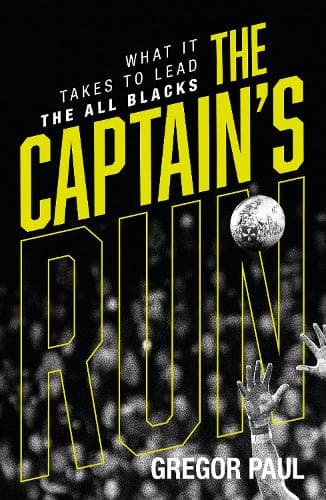Review: The Captain’s Run: What it Takes to Lead the All Blacks
Reviewed by Michael Burgess
Reuben Thorne still feels the pain. Almost two decades on from the failure that defined his career, his emotion is raw when he discusses the 2003 Rugby World Cup and the grim fallout that followed.
It’s one of the fascinating episodes from The Captain’s Run, an in-depth look at the role of All Blacks skipper and how it has evolved. New Zealand has changed a lot during the last five decades but the importance attached to the All Blacks captain, often compared in terms of profile to the Prime Minister, remains as strong as ever.
Previous books on the “men who led” focussed on their individual backgrounds and subsequent rise to the top. This takes a more interesting approach, weaving together different themes, from the politics of the amateur era to the relationships between coaches and captains, and achieves greater depth as a result. It looks at the overhaul of the All Blacks’ binge drinking traditions, the development of the leadership group and the burden of expectation each new skipper carries.
A chapter entitled Tough Love is particularly compelling, detailing how Kieran Read was driven to make the All Blacks’ environment more inclusive, especially for new players, while other skippers, particularly Sean Fitzpatrick, tried to dismantle the symbolism of the “back seat of the bus” from which senior players dictated the culture of the team.
“The world’s greatest rugby team operated like a boarding school riddled with institutional bullying,” is author Gregor Paul’s succinct and stunning take.
Many of the captains from the last 50 years have been interviewed and there are fresh revelations, particularly from Taine Randall and Thorne about their high profile, unsuccessful tenures, which might generate both sympathy and understanding.
Randall is clearly still bemused about the circumstances of his elevation at 23, when his “scarfie” flatmates took delight at targeting his sponsored car during egg fights. There is some wonderful candour from Justin Marshall, especially about the way he lost the job at the end of the 1997 season, and Fitzpatrick on his ups and downs.
Some of the best insight comes from the amateur men - Graham Mourie, Wayne ‘Buck’ Shelford and a 75-year-old Andy Leslie – who had the same heavy responsibility without all the support that is put around today’s leaders.
It’s a touch parochial at times, especially about the Brian O’Driscoll incident on the 2005 Lions tour, which feels overly sympathetic to Tana Umaga, but it’s certainly not myopic. That’s illustrated when Paul dissects a litany of controversial incidents that have fallen in the All Blacks’ favour.
Could it be, especially with the skippers, part of the “Michael Jordan effect”, where referees are overawed or intimidated and that affects their decision-making, consciously or otherwise?
Across his career, Paul has developed close relationships with some subjects but he doesn’t stray from judgement or sugar coat potential short comings. As an example, the book is highly positive about Read’s overall impact but doesn’t gloss over the painful loss in Yokohama last year, which blighted his legacy forever.
Paul has covered the All Blacks for almost two decades and countless tours, and readers will enjoy behind-the-scenes glimpses of life following the team, especially the sharply honed observations and things that happens on the margins.
Like Richie McCaw’s encounter with a camera wielding Kate Hawkesby at a press conference before the 2015 Rugby World Cup final, “never has the expression `a face like thunder’ rung more true” or the underlying reason for Steve Hansen’s “if you want to spend some time outside” jibe towards a reporter after the 2019 World Cup exit.
There’s an entertaining episode with a quintessential “toff” at Twickenham “a pink shirt, Burberry jacket and checked cheese cutter” and a curious midnight phone call from legendary spin doctor Alistair Campbell during the 2005 Lions tour. You are there with a grumpy Hansen in a stuffy Edinburgh hotel, and can feel the awkwardness when McCaw all but shuns a member of the team in the London hotel lobby.
The assertion that the All Blacks are “probably the most intimidating sports team in the world to be part of” might be challenged, given the fervour about football in Brazil, Argentina or England, or the passion for cricket in India and Pakistan, but that’s a minor quibble.
It’s a wonderful read, blending crisp, knowledgeable analysis, clever use of anecdotes, insightful interviews and some of Paul’s trademark dry humour to provide an authoritative study on a fascinating subject.
Reviewed by Michael Burgess
